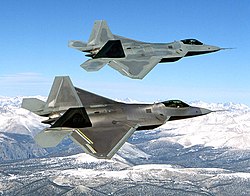US Air Force upgrades F-22 oxygen system after deadly crash
Wednesday, March 21, 2012

The United States Air Force is replacing emergency oxygen handles on its 170 F-22 Raptor jet fighters. The move follows a report into a November 2010 crash that killed a pilot in Alaska.
The report finds Captain Jeffrey Haney's death was partly due to aircraft design flaws. The experienced 31-year-old was on a night mission when his aircraft crashed nose-down among mountains. Planemaker Lockheed Martin now faces legal action from his widow Anna, which they vow to contest.
The report identified three separate problems with the ring handle to activate emergency oxygen. The first was that pulling the ring could require intense effort, the second that it was possible to drop the ring between seats, and the third that pilots in cold-weather gear could struggle to grasp it.
Now new handles have been designed in Arizona and the Air Force will place them on all of the $143 million aircraft. All 40 Raptors at Haney's base, Joint Base Elmendorf-Richardson near Anchorage, have received the $47 upgrade. The Air Force bought 200 of them.
Haney's death has been attributed by his employer as the result of his "channelized attention" on getting the main oxygen system to restart after it automatically cut out when it detected engine bay air leaks. This makes breathing through the jet's mask difficult. The Air Force say he should have activated his emergency oxygen but the accident report and lawsuit question his ability to do so. The report notes he was conscious and fighting to keep his jet airbourne up until impact.
Documents filed with a court in Illinois claim the handle's position is "in an area impossible for a pilot to reach while he or she maneuvered the sophisticated aircraft at speeds exceeding the speed of sound and while he or she experienced forces many times the force of gravity."
The fatal accident is not the only such problem to beset the F-22, which despite being billed by the Air Force as their most advanced fighter has never been deployed to combat since coming into service seven years ago. Three other Joint Base Elmendorf-Richardson pilots activated emergency oxygen supplies during "physiological incidents" last month, said a spokesperson for the base. Raptors were grounded nationwide for five months last Summer over the oxygen systems.
Sources
- The Associated Press. "F-22 fighter jets retrofitted after Alaska crash" — CNBC, March 21, 2012
- W.J. Hennigan. "Air Force to modify F-22 following fatal crash" — The Los Angeles Times, March 20, 2012
